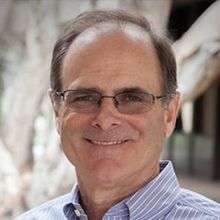Stephen Peace
James Stephen Peace (born March 30, 1953) is an American film writer, producer, and Democratic politician.
Steve Peace | |
|---|---|
 | |
| California State Senate | |
| In office 1993–2002 | |
| California State Assembly | |
| In office 1982–1992 | |
| Personal details | |
| Born | March 30, 1953 San Diego, California, U.S. |
| Political party | Democratic |
| Spouse(s) | Cheryl Peace |
| Children | 3 |
| Residence | El Cajon, California |
| Alma mater | UC San Diego |
Peace was born in San Diego to two teachers. He attended Bonita Vista High School, where he played football and basketball and was president of the student body. He attended U.C. Davis and the University of California, San Diego, majoring in political science.
His film credits include the Killer Tomatoes cult series: Attack of the Killer Tomatoes! (actor, producer, writer), Return of the Killer Tomatoes! (actor, producer, writer), Killer Tomatoes Strike Back (actor, producer), and Killer Tomatoes Eat France (producer, writer). He also produced, wrote, and acted in the 1987 film Happy Hour.
Peace got his start in politics as a protégé of State Senator Wadie Deddeh and Assemblyman Larry Kapiloff. He served in the California State Assembly from 1982–1992 and the California Senate from 1993–2002.
In 2000 and 2001, then-Senator Peace authored the first laws in the nation aimed at protecting the privacy of individuals' personal information by requiring companies to inform consumers of data breaches. Senate Bill 129 also created the Office of Privacy Protection within the Department of Consumer Affairs to inform the public of potential options for protecting their privacy, receive complaints concerning persons unlawfully using others' personal information, and to help prosecute identity theft and other privacy-related crimes.[1]
Peace was the chairman of the Senate Committee on Energy from 1995–1997. During this time, the electricity deregulation bill, AB 1890, was passed and signed into law by Governor Pete Wilson. Some incorrectly named Peace as author of this bill, but the author was Jim Brulte, a Republican from Rancho Cucamonga.[2] Many believed this bill led to the California electricity crisis of 2000 and 2001.[3] At the time, several prominent California newspapers came out in support of AB 1890, including the San Jose Mercury News. An editorial from 1996 supported the measures taken by the legislature at the time:
Last year, the California Public Utilities Commission rolled out a plan to turn electric power monopolies into free-market competitors. It was a flickering bulb. A half-dozen legislators and their staffs burned the midnight oil this summer to improve it. What they have produced glows brightly. Their plan protects residential and small business customers; it treats public and investor-owned utilities fairly; it maintains important social programs such as energy efficiency and assistance.[4]
The "Steve Peace Death March" (over 200 hours of televised public hearings), produced a measure that passed both houses without any opposing votes. After two years of successful operation the California market collapsed. Consensus at the time was that the collapse was the result of flawed market design and consumer price caps included in AB1890.[5] The energy crisis was enough to cause him to abandon a possible run for California Secretary of State.
In the years after the energy crisis, successful legal challenges and information about market abuse by Enron and ineffective federal oversight by the Federal Energy Regulatory Commission emerged which many, including Peace, contend proved that the crisis was not, as pundits claimed at the time, a result of "his" energy bill.
After being term-limited out of the State Senate, he served as Director of the California Department of Finance.
After leaving public service, Peace served as Senior Advisor to JMI Inc., the San Diego Padres and former Padres owner John Moores from 2005 to December 2016. He also served as a Founding Director of the California Independent Voter Project during which time he wrote California's Nonpartisan Open Primary Constitutional Amendment. He has served on the Board of the UCSD Scripps Institute of Oceanography and as Chairman of the Board of Chicago-based, Authentify, Inc., the privately held company that pioneered dual authentication security for online financial transactions. He currently serves as Chairman of the Board of Killer Tomatoes Entertainment and as a member of the Board of Directors of Preservation Ranch. He is a principal in the consulting firm JSPeace and Associates.
He married his wife Cheryl in 1973, and has three sons and five grandchildren.
Trivia
- In a Killer Tomatoes DVD making fun of "Where are they now?", Peace was shown wearing a suit walking into the California Senate with an open parachute attached to his back, spoofing his Killer Tomatoes character Wilbur Finletter, who was usually seen dragging an open parachute in the same manner.
References
- Peace. "SB 129 Senate Bill - CHAPTERED". Retrieved March 31, 2017.
- "How California's Consumers Lost With Electricity Deregulation". Archived from the original on June 28, 2012. Retrieved March 31, 2017.
- "California - Timeline - Blackout - FRONTLINE - PBS". Retrieved March 31, 2017.
- Editorial Board (August 29, 1996). "Utility Competition: Switch on the Plan". San Jose Mercury News. Retrieved July 27, 2011.
- "Genesis Of State's Energy Fiasco / String of bad decisions on deregulation could end up costing consumers $40 billion". Retrieved March 31, 2017.